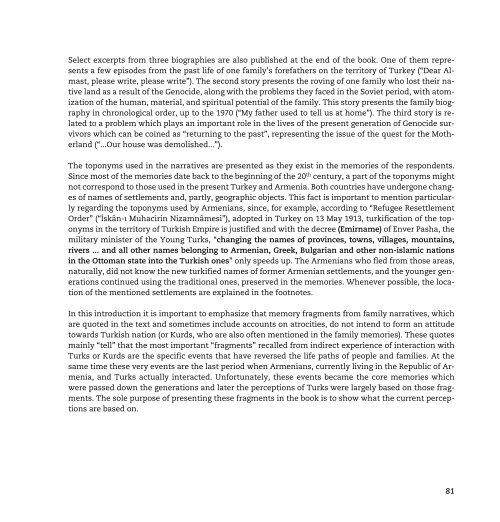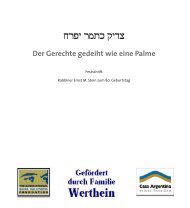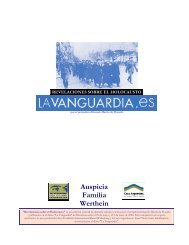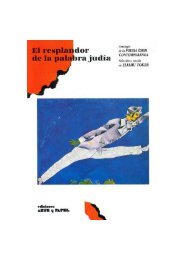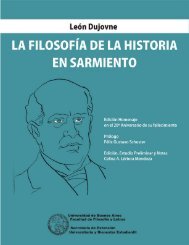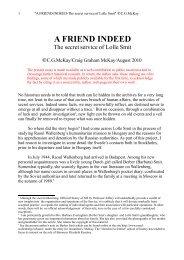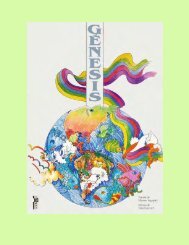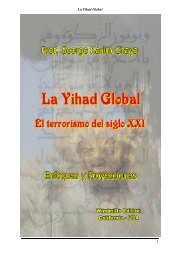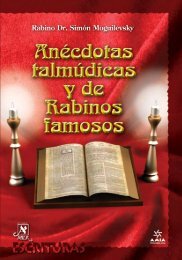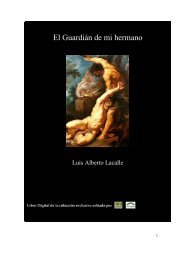Speaking to One Another - The International Raoul Wallenberg ...
Speaking to One Another - The International Raoul Wallenberg ...
Speaking to One Another - The International Raoul Wallenberg ...
- No tags were found...
You also want an ePaper? Increase the reach of your titles
YUMPU automatically turns print PDFs into web optimized ePapers that Google loves.
Select excerpts from three biographies are also published at the end of the book. <strong>One</strong> of them representsa few episodes from the past life of one family’s forefathers on the terri<strong>to</strong>ry of Turkey (“Dear Almast,please write, please write”). <strong>The</strong> second s<strong>to</strong>ry presents the roving of one family who lost their nativeland as a result of the Genocide, along with the problems they faced in the Soviet period, with a<strong>to</strong>mizationof the human, material, and spiritual potential of the family. This s<strong>to</strong>ry presents the family biographyin chronological order, up <strong>to</strong> the 1970 (“My father used <strong>to</strong> tell us at home”). <strong>The</strong> third s<strong>to</strong>ry is related<strong>to</strong> a problem which plays an important role in the lives of the present generation of Genocide survivorswhich can be coined as “returning <strong>to</strong> the past”, representing the issue of the quest for the Motherland(“...Our house was demolished...”).<strong>The</strong> <strong>to</strong>ponyms used in the narratives are presented as they exist in the memories of the respondents.Since most of the memories date back <strong>to</strong> the beginning of the 20 th century, a part of the <strong>to</strong>ponyms mightnot correspond <strong>to</strong> those used in the present Turkey and Armenia. Both countries have undergone changesof names of settlements and, partly, geographic objects. This fact is important <strong>to</strong> mention particularlyregarding the <strong>to</strong>ponyms used by Armenians, since, for example, according <strong>to</strong> “Refugee ResettlementOrder” (“İskân-ı Muhacirin Nizamnâmesi”), adopted in Turkey on 13 May 1913, turkification of the <strong>to</strong>ponymsin the terri<strong>to</strong>ry of Turkish Empire is justified and with the decree (Emirname) of Enver Pasha, themilitary minister of the Young Turks, “changing the names of provinces, <strong>to</strong>wns, villages, mountains,rivers ... and all other names belonging <strong>to</strong> Armenian, Greek, Bulgarian and other non-islamic nationsin the Ot<strong>to</strong>man state in<strong>to</strong> the Turkish ones” only speeds up. <strong>The</strong> Armenians who fled from those areas,naturally, did not know the new turkified names of former Armenian settlements, and the younger generationscontinued using the traditional ones, preserved in the memories. Whenever possible, the locationof the mentioned settlements are explained in the footnotes.In this introduction it is important <strong>to</strong> emphasize that memory fragments from family narratives, whichare quoted in the text and sometimes include accounts on atrocities, do not intend <strong>to</strong> form an attitude<strong>to</strong>wards Turkish nation (or Kurds, who are also often mentioned in the family memories). <strong>The</strong>se quotesmainly “tell” that the most important “fragments” recalled from indirect experience of interaction withTurks or Kurds are the specific events that have reversed the life paths of people and families. At thesame time these very events are the last period when Armenians, currently living in the Republic of Armenia,and Turks actually interacted. Unfortunately, these events became the core memories whichwere passed down the generations and later the perceptions of Turks were largely based on those fragments.<strong>The</strong> sole purpose of presenting these fragments in the book is <strong>to</strong> show what the current perceptionsare based on.81


